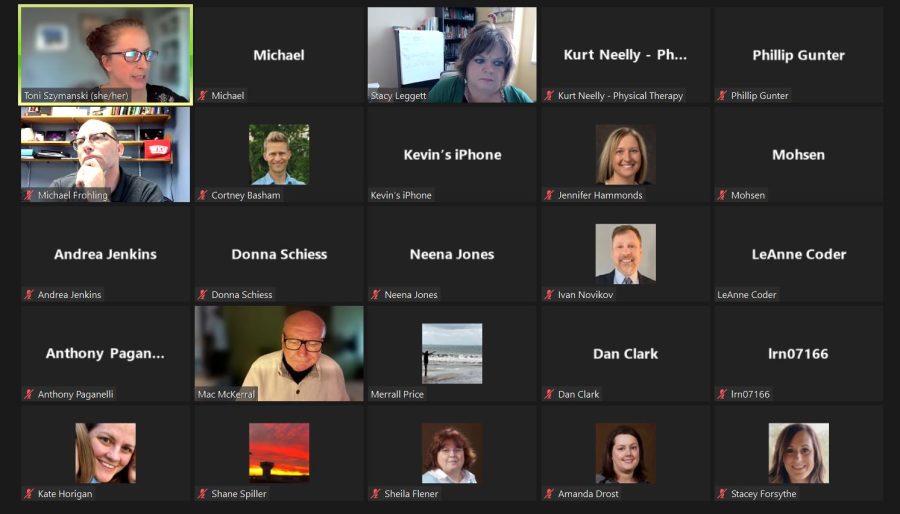Compensation, budget committee transparency discussed in Faculty Senate
WKU’s Faculty Senate met via zoom on Oct. 20, 2022.
September 23, 2022
Compensation and WKU’s Budget Executive Committee proved to be hot-button topics at Thursday’s Faculty Senate meeting.
Faculty Senate Chair Toni Szymanski, a member of the BEC, said the committee had recently met to discuss compensation options: a “one-time inflation adjustment” and a 2% raise pool.
“The committee voted on a way to allocate the raises that will be forwarded to the […] provost and the president,” Szymanski said.
Concerning the one-time payment, Szymanski said the specifics are still being discussed, but it will be the equivalent of a “bonus” paycheck.
“An ad hoc committee was formed to look at, and make recommendations on, if there was going to be some kind of a one-time payment [and] how the committee would recommend that it would be paid out,” Szymanski said.
The one-time inflation adjustment was met with concerns from some of the senators. According to the Consumer Price Index, inflation is up 8.3% compared to last year.
“A one-time payment to offset inflation doesn’t seem to make sense unless prices are expected to deflate back to where they were,” Dan Clark, assistant professor of mathematics, said. “I mean, it’s better than nothing, but at year two the one-time payment isn’t there but inflated prices still are.”
Kirk Atkinson, a professor in the Gordon Ford College of Business and a member of the BEC, said the one-time payment would come from “cash on hand” and not from the yearly budget.
Szymanski said the deadline for the raises is Oct. 18 “so it can go to the HR department.” The one-time payment recommendation has no set deadline, she said.
Gordon McKerral, a professor in WKU’s journalism program, questioned the makeup of the BEC.
“This has come up before with regard to university-wide committees and really a lack of representation in regards to faculty,” McKerral said. “I don’t know the [breakdown] of the BEC, but I’d guess a majority is administration – and when you’re talking compensation, and the committee is so heavily weighted with administrators, there’s not much chance the faculty is going to come out of it good.”
Szymanski said roughly 25% of the BEC is made up of faculty and staff members.
“I don’t expect us to be a majority,” McKerral said. “But I’d suspect we’d want to do better than 25%.”
Szymanski said there were multiple “differing opinions” discussed during the ad hoc committee, but went with “majority rule” in narrowing down the options.
“Because it’s finances and because a recommendation has not been approved yet, rather than having rumors run rampant, we’re supposed to keep everything confidential,” Szymanski said. “I think because these are decisions still in flux.”
This notion of confidentiality was met with concern from McKerral.
“This is not the first time this has come up where university committees are formed to deal with extremely important issues, but they can’t talk to us,” McKerral said. “[…] All I keep hearing about is how transparent this administration is, and I just laugh whenever I hear it because it’s not transparent at all.”
Associate Provost Rob Hale said no “gag rule” was being enforced.
“I just ask the chair, one of the chairs of [the BEC] if everyone was told to not talk, or if there was any kind of gag order,” Hale said. “The chair said no.”
Szymanski offered to include all discussed options for compensation in the next senate meeting’s agenda.
“The 2% is what’s being recommended,” Szymanski said. “The president and the provost will make their decision and however they decide to go, that will take effect January 2023.”
Another issue brought to the senate for discussion was the Big Red Backpack program.
WKU Student Government Association President Cole Bornefeld was asked to speak about a meeting he had with Jennifer Tougas, assistant vice president for business services in the division of strategy, operations and finance, in the past month regarding the program.
“We talked about the opt-out process, we talked a lot about the communications issues that took place there in the beginning of the semester, and she said they are currently working to make sure a lot of those […] issues are eliminated going into this semester,” Bornefeld said.
During discussion, it was brought up that the program had “upset” a lot of graduate students due to its automatic opt-in nature – something not ideal, one senator said, because “they are fighting with online options to get graduate students.”
“It makes sense for undergraduates to be automatically enrolled, but for graduates, because most of our classes are online, we might want to [ask],” Szymanski said.
McKerral said he believed the entire program should be opt-in and not an opt-out program as it is now.
“I think that 90% of all the headaches would disappear if this program was an opt-in and not an opt-out,” McKerral said.
In the end, the issue was referred to the graduate committee for further discussion by a motion by two graduate faculty members.
The Senate’s next meeting is scheduled for Thursday, Oct. 20 via Zoom.
Administration reporter Michael Crimmins can be reached at [email protected].













